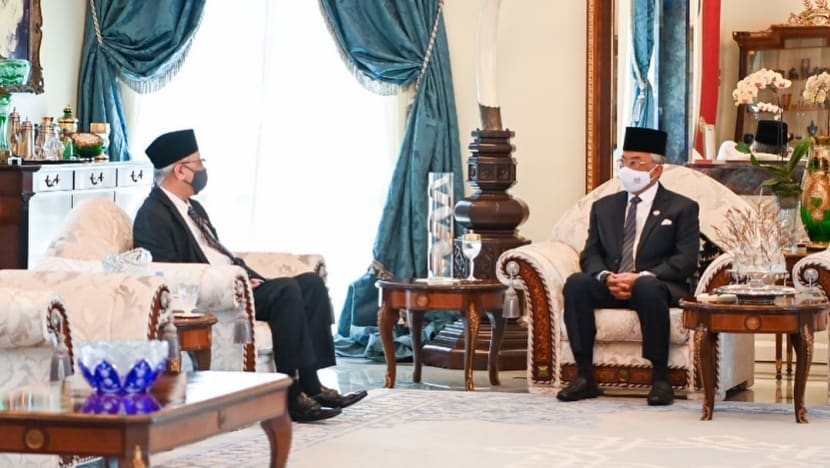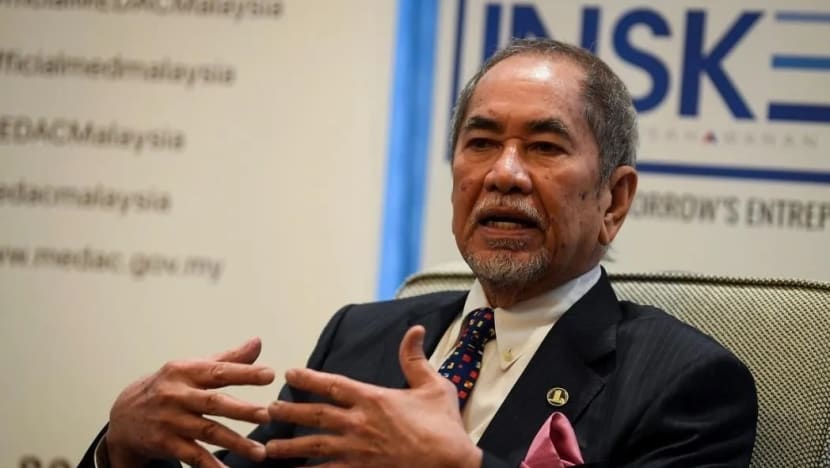Malaysian king told PM Ismail Sabri confidence vote to prove his majority is not needed: Minister

Malaysian King Al-Sultan Abdullah Ri'ayatuddin Al-Mustafa Billah Shah (right) granted an audience to Prime Minister Ismail Sabri Yaakob at Istana Abdulaziz di Kuantan, Pahang, on Aug 26. 2021. (Photo: Facebook/Istana Negara)
PUTRAJAYA: Malaysia’s de facto law minister Wan Junaidi Tuanku Jaafar has claimed that the king had earlier given his consent that a vote of confidence to prove Mr Ismail Sabri Yaakob’s legitimacy as the prime minister would not be needed.
Speaking in a press conference on Tuesday (Sep 7), the minister in the prime minister’s department said it was conveyed by the king during an audience with the prime minister.
“When the prime minister had the audience with the king, we received His Majesty's consent that a vote of confidence was not needed," he said, adding that Mr Ismail Sabri relayed the royal consent to the ministers during the first Cabinet meeting.
"Because that appointment is very new, and according to the Constitution, in my personal view, the Constitution gives the king the highest power to appoint a prime minister who in his opinion is likely to command a majority, which at that time was 114,” the minister said.
During a power vacuum in Putrajaya in mid-August following the resignation of Mr Muhyiddin Yassin, the king had requested the country’s 220 MPs to submit a statutory declaration (SD) naming their preferred prime minister candidate.
The king had then said that the next prime minister should table a confidence motion in the parliament as soon as possible.
Mr Ismail Sabri emerged as the MP commanding a majority support with 114 SDs in his favour. He was sworn in as Malaysia’s ninth prime minister on Aug 21, after the king summoned all 114 MPs to verify their support for him.
However, opposition politicians took to social media to highlight that the confidence motion had not been included in the agenda of the next parliament meeting scheduled to begin next Monday.
Mr Wan Junaidi said in his Tuesday press conference that Mr Ismail Sabri’s majority support is “not an assumption” as the MPs who supported him had stepped forward to verify their SDs before the king.
The minister added that he did not foresee that the MPs would change their minds in the short term.
“In six to seven months, there might be a change in thinking. But in the short term, I don't think people will change their thinking that quickly.
“Thus the king consented that a confidence vote was not needed to be implemented,” he said.
Over the weekend, Attorney-General Idris Harun had suggested that the prime minister need not table a confidence vote in parliament.
He noted that if Mr Ismail Sabri’s legitimacy still needed to be tested by any party apart from the king, it would mean the absolute power of the ruler could be overridden.
“And this is not in line with the Federal Constitution,” he said in a statement, referring to how the king had named Mr Ismail Sabri as prime minister after meeting 114 out of 220 MPs on Aug 19 to verify their support for the Bera MP.
The attorney-general’s views were rebuked by the opposition.
Pakatan Harapan’s (PH) presidential council wrote in a statement on Sunday that the attorney-general’s suggestion could be deemed treasonous as it was contrary to the order given by the king to party leaders on Aug 17.
“The presidential council considers that the statement of the AG on behalf of the government is very rude, violates the spirit of the Federal Constitution, and even violates the order and is also traitorous against His Majesty,” said PH’s statement, according to a report by the Star.

ELECTION COMMISSION INSTRUCTED TO IMPLEMENT UNDI18
In the same press conference, Mr Wan Junaidi said he had ordered the Election Commission (EC) to do what was needed to implement a decision by the High Court in Kuching to lower the voting age to 18 by Dec 31 at the latest.
“I have ordered the EC to do whatever is needed based on its powers and following what was stated by the judge in the Kuching decision, to carry it (the judicial review decision) out,” the minister said.
On Sep 3, the High Court ruled in favour of five Sarawakian youths who sought to compel the implementation of the lower voting age. They had named the prime minister, the Malaysian government and the EC as respondents in their judicial review application.
Judicial Commissioner Alexander Siew said the delay in the implementation from the initial schedule of July this year to September next year was unexplained, irrational and unreasonable, according to the Star.
Mr Wan Junaidi said the court order remained as a law that needed to be followed, and the government had not made a decision on whether to appeal the High Court’s decision.
The minister added that five states had not amended their state constitutions to allow candidates to stand for election as state legislators at 18 years old.
“I told the EC I will personally engage these states,” he said, adding that he was also discussing with the EC and the attorney-general on what needed to be done in the event the states still did not agree to lower the age for state legislature candidates.
The constitutional amendment to lower the voting age from 21 to 18, popularly known as “Undi18” (Vote18), was passed in July 2019 after receiving over two-thirds of votes from the MPs in the parliament.
Besides allowing 18-year-olds to vote and contest in elections, the Bill also included automatic voter registration.
Former de facto law minister Takiyuddin Hassan had said that the implementation of Undi18 and automatic voter registration was expected to be implemented in July 2021.
However, in March, the EC decided to postpone both to Sep 1 next year.















